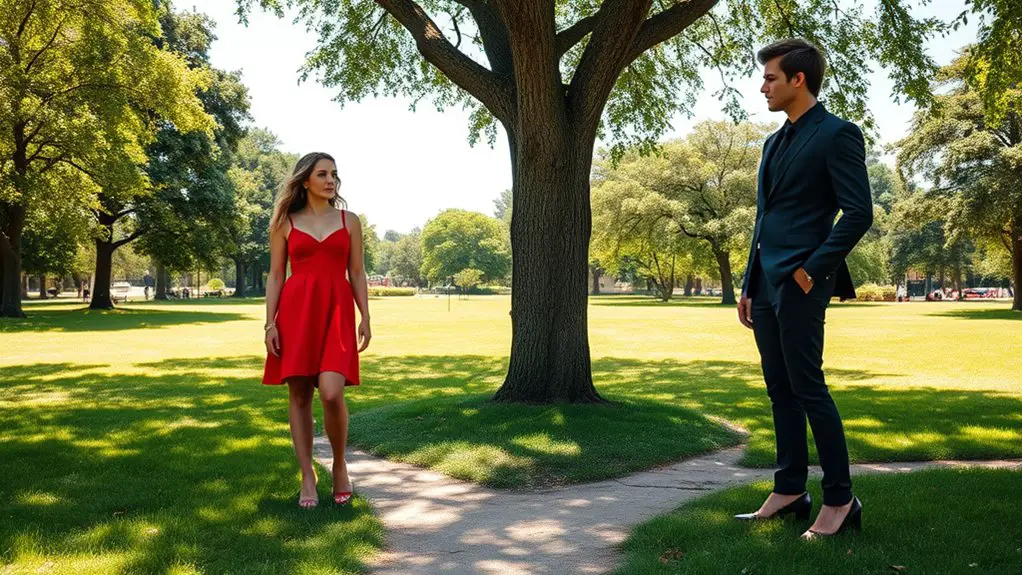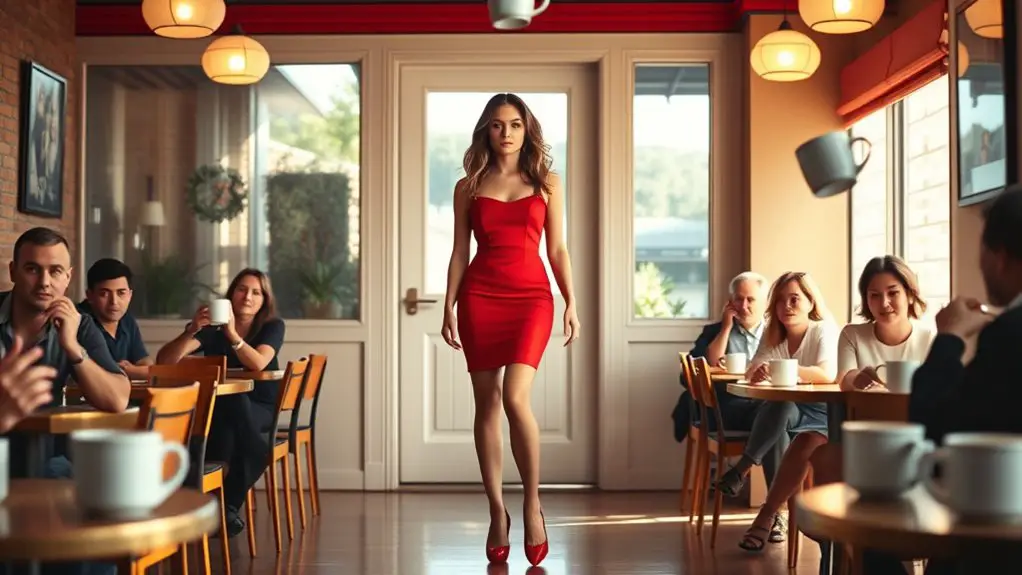In romantic comedies, memorable heel moments often arise from unexpected love triangles, betrayals, and manipulative actions. These twists complicate relationships, revealing emotional stakes that keep you engaged. A best friend’s betrayal can evoke sympathy, while a rival’s surprise entrance injects humor and conflict. Misunderstandings and last-minute confessions heighten drama, challenging characters to confront their feelings authentically. These dynamic conflicts elevate the narrative, making you root for the characters even more, and there’s so much more to discover.
The Unexpected Love Triangle

Although romantic comedies often follow predictable patterns, the unexpected love triangle can add a rejuvenating twist that keeps viewers engaged. When you encounter characters with unexpected chemistry, it challenges conventional narratives and invites you to invest emotionally. These triangles create tension, illuminating the complexities of desire and affection. You find yourself rooting for more than just one couple; your loyalties become tangled, reflecting the characters’ own complicated loyalties.
This dynamic not only heightens drama but also enriches the storyline, prompting you to question whom the protagonist should choose. The emotional stakes rise, making every interaction charged with significance. As you watch, you can’t help but become engrossed in the intricacies of relationships, as characters navigate their feelings and commitments. It’s this interplay of attraction and allegiance that transforms a standard rom-com into a memorable experience, reminding you that love isn’t always straightforward.
The Best Friend Betrayal
When a best friend betrays the protagonist in a romantic comedy, the emotional fallout can be both shocking and enchanting. This moment serves as a pivotal plot twist, forcing the protagonist—and the audience—to confront deep-seated feelings of trust and loyalty. The betrayal often unfolds in a way that reveals the complexities of friendship and romance, challenging your expectations.
You might find yourself torn between sympathy for the betrayed friend and understanding the motivations behind the betrayal. The unexpected consequences ripple throughout the narrative, reshaping relationships and altering character trajectories. This emotional upheaval not only heightens the stakes but also elevates the comedy, as humor often arises from the absurdity of the situation.
Ultimately, a best friend betrayal adds depth to the story, transforming it from a simple love story into a rich exploration of human emotions, making it one of the most memorable heel moments in the genre.
The Rival’s Surprise Entrance

As the plot builds toward a climactic moment, the rival’s surprise entrance often serves as a game-changing twist in romantic comedies, injecting both tension and humor into the narrative. You can’t help but feel the palpable excitement when the rival bursts onto the scene, their motivation typically driven by jealousy or desire. This unexpected arrival disrupts the protagonist’s carefully laid plans, creating an instant conflict that heightens viewer engagement.
The rival’s entrance reveals layers of emotional stakes, forcing characters to confront their feelings and choices. It’s not just about competing for love; it’s about the lengths one will go to assert dominance. This tension is balanced with humor, as the rival often embodies exaggerated traits that elicit laughs while simultaneously raising the stakes. In this way, the surprise entrance transforms the romantic landscape, challenging the hero and ultimately enriching the storyline.
The Ex Who Won’t Let Go
In the landscape of romantic comedies, the ex who won’t let go can serve as a formidable obstacle for the main couple, often complicating their journey toward love. This character embodies the tension between past and present, as their ex’s obsession reveals lingering feelings that threaten to disrupt new relationships. You’ll find that this trope heightens conflict, pushing the protagonists to confront their emotional baggage.
Moreover, the ex often uses manipulative tactics, creating drama that keeps viewers engaged. Their antics force the couple to prove their commitment, leading to key moments of growth and self-discovery. While the ex can be frustrating, they ultimately serve a purpose; they challenge the protagonists to assess what they truly want. As you watch, consider how these obstacles not only elevate the stakes but also deepen the emotional resonance, making the eventual triumph of love all the more satisfying.
The Misunderstood Gesture

While misunderstandings are a staple of romantic comedies, the misunderstood gesture stands out as a particularly poignant device, encapsulating the complexities of communication in relationships. These moments often stem from misinterpreted signals, fueling romantic miscommunication and propelling the plot forward.
Consider the following elements that enhance the impact of these gestures:
- A romantic dinner gone wrong, where a surprise is misread as a rejection.
- An accidental text sent to the wrong person, igniting jealousy or confusion.
- A heartfelt gift misinterpreted as an obligation rather than affection.
- A spontaneous kiss perceived as a friendship gesture, leading to heartache.
- A public declaration of love that’s misread as a joke, causing distance.
Ultimately, these moments reveal how fragile communication can be, highlighting the emotional stakes involved. You can’t help but root for the characters to overcome their misunderstandings and find clarity in their relationships.
The Overzealous Wingman
When you think about the overzealous wingman, it’s easy to see how their good intentions can lead to unwanted interference in romance. These characters often spark hilariously awkward situations, turning what should be a simple connection into a comedy of errors. Their misguided enthusiasm not only complicates relationships but also highlights the fine line between support and sabotage in love.
Unwanted Interference in Romance
Though friendships often thrive on support, the presence of an overzealous wingman can quickly turn romance into a comedic disaster. You may find yourself caught in emotional turmoil as they unwittingly engage in romantic sabotage, leaving chaos in their wake. Here are some classic pitfalls:
- Over-Promoting: They hype you up so much that expectations skyrocket.
- Misreading Signals: They might misinterpret your interests, leading to awkward scenarios.
- Unsolicited Advice: Their constant suggestions can overwhelm rather than help.
- Cringeworthy Interventions: They might take it upon themselves to play matchmaker, often with disastrous results.
- Dramatic Outbursts: Their loud antics can draw unwanted attention, making your crush flee.
In the end, a little distance from your wingman could save your budding romance from a comedic fate.
Hilarious Misunderstandings Ensue
As the overzealous wingman dives headfirst into the matchmaking arena, the potential for hilarious misunderstandings skyrockets. You can’t help but appreciate how misguided intentions lead to miscommunication chaos. These moments not only provide comic relief but also highlight the pitfalls of over-involvement in love.
| Misguided Intentions | Resulting Miscommunication Chaos |
|---|---|
| Trying to impress a crush | Confusing them with a friend’s signals |
| Overtexting after a date | Making the date feel smothered |
| Misinterpreting a flirty joke | Sparking an awkward confrontation |
In these scenarios, it’s clear: the wingman’s enthusiasm often backfires, turning romantic pursuits into laughable disasters. You can’t help but wonder—can true love survive such comedic calamities?
The Deceptive Proposal
In romantic comedies, a deceptive proposal often serves as the catalyst for unforeseen relationship twists that can leave you questioning the authenticity of love. As manipulative intentions come to light, characters are forced into heartfelt confessions, revealing the true cost of their deceit. These moments not only shake the foundation of their relationships but also invite you to reflect on the fine line between romance and manipulation.
Unforeseen Relationship Twists
While romantic comedies often thrive on predictable narratives, the trope of the deceptive proposal introduces a thrilling twist that can redefine character dynamics and audience expectations. These unforeseen relationship twists can lead to:
- Unexpected breakups that challenge established bonds
- Secret identities that complicate interactions
- Shocking revelations, altering the course of love
- Hidden agendas fueling romantic misfires
- Spontaneous decisions resulting in emotional confrontations
When characters confront these last-minute twists, surprise encounters often spark heartfelt apologies, allowing for growth and deeper connections. This complexity not only keeps viewers engaged but also prompts them to reflect on the nature of love and trust. Ultimately, these twists transform the story, leaving lasting impressions that resonate beyond the film’s end.
Manipulative Intentions Revealed
When a character springs a deceptive proposal, it often serves as a catalyst that exposes manipulative intentions lurking beneath the surface. These moments reveal how selfish desires can drive individuals to engage in emotional games, leaving their partners in confusion and heartbreak. You might notice how the seemingly innocent proposal masks hidden agendas, forcing the audience to reconsider the character’s true motives. The manipulation isn’t just for plot twist; it’s a stark reminder of how love can be weaponized. By showcasing these manipulative motives, romantic comedies challenge you to question the authenticity of relationships. Ultimately, these heel moments not only entertain but also provoke thought about the complexities of human connections and the lengths people will go to for their own gain.
Heartfelt Confessions and Consequences
The aftermath of a deceptive proposal often leads to heartfelt confessions that unravel the tangled web of lies spun throughout the story. You witness the emotional fallout as characters confront their choices, revealing deeper truths about themselves and their relationships. In these moments, redemption isn’t just possible; it’s essential. Key elements emerge, such as:
- The realization of true intentions
- The struggle between love and betrayal
- Vulnerability as a pathway to forgiveness
- The impact of honesty on relationships
- The journey toward self-discovery and growth
These confessions transform the narrative, allowing for love redemption. They highlight that beneath the surface of deceit lies the potential for genuine connection, proving that even the most flawed characters can find their way back to each other.
The Last-Minute Confession
In romantic comedies, a last-minute confession can serve as the emotional climax that not only resolves tension but also reinforces the characters’ growth. These moments often follow secret rendezvous, where the stakes are heightened, and emotions run deep. You might find yourself on the edge of your seat, anticipating that dramatic disclosure that could change everything.
When a character finally musters the courage to reveal their true feelings, it’s a pivotal moment that transforms their relationship. This honesty breaks down barriers, shifting the narrative from misunderstanding to connection. Such confessions challenge both characters to confront their fears, showcasing vulnerability as a strength rather than a weakness.
Ultimately, these last-minute admissions remind us that love is about taking risks. They encapsulate the essence of romantic comedies, where the journey to self-discovery culminates in a heartfelt, transformative moment that resonates with audiences long after the credits roll.
The Moment of Truth Showdown
How do you define a pivotal moment in a romantic comedy? Often, it’s the “Moment of Truth Showdown,” where love rivalries come to a head, and truth revelations shake the foundation of relationships. This scene captures the essence of tension, vulnerability, and emotional stakes.
In these moments, you might notice:
- The protagonist confronting their feelings head-on.
- An unexpected twist revealing hidden truths.
- A rival’s desperate attempt to win back their love.
- Characters facing the consequences of their choices.
- A cathartic release that leads to growth and reconciliation.
These confrontations not only heighten drama but also push characters toward self-discovery. They remind us that love isn’t just about fairy tale endings; it’s about the courage to face uncomfortable truths and the rivalries that shape our connections. Ultimately, these showdowns are critical in defining the characters, enriching the narrative, and making the love story unforgettable.
Frequently Asked Questions
What Makes a Character a “Heel” in Romantic Comedies?
A character’s a “heel” when their motivations clash with audience expectations. You see them as selfish or deceitful, creating tension. This contrast drives the narrative, challenging perceptions of love and redemption that romantic comedies typically embrace.
How Do Heel Moments Enhance the Plot of a Romantic Comedy?
Heel moments deepen character motivations, creating unexpected plot twists that challenge your expectations. They drive conflict and tension, making the story more engaging. Without these moments, romantic comedies would lack the emotional stakes that captivate you.
Are There Common Traits Among Memorable Heel Characters?
Memorable heel characters often share traits like complex character motivations and the ability to evoke audience empathy. Their flaws make them relatable, deepening the narrative and enhancing emotional stakes, ultimately driving the story forward in unexpected ways.
What Are the Audience’s Typical Reactions to Heel Moments?
When a heel struts onto the stage, you can’t help but feel a mix of shock and laughter. The audience’s empathy swells, perfectly timed with comedic beats, creating a rollercoaster of emotions that captivates everyone.
How Can Heel Moments Influence Character Development in Romantic Comedies?
Heel moments can catalyze character redemption and emotional growth, pushing you to confront flaws and evolve. They challenge perceptions, revealing deeper motivations, ultimately paving the way for relatable transformations that resonate with audiences on multiple levels.
